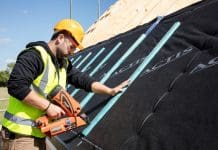Premier Modular has worked closely with its waste management partners, ACM, to set up new systems and procedures for recycling to ensure there is zero waste to landfill
In addition to achieving zero waste in manufacturing, offsite construction radically reduces vehicle movements to site so there is less congestion, and it reduces material waste and damage on site.
The speed and quality benefits of offsite construction are well documented, but reducing the impact of construction on the environment is another important reason to choose offsite construction.
The greater precision of offsite manufacture also means construction to very accurate tolerances, which reduces air permeability and heat loss from the finished buildings.
This results in less energy consumption to heat a building and the associated reductions in carbon emissions.
How did Premier Modular achieve zero waste to landfill?
- Wood is collected, shredded and used for biomass fuel at a local power station;
- Plasterboard offcuts are sent to a plasterboard recycling specialist to be turned back into plasterboard;
- Cardboard is pulped for paper manufacture;
- Polythene is washed and processed into pellets which can be turned into a variety of products including polythene;
- Food waste is taken to an anaerobic digestion facility where the gases are extracted to generate electricity and any remaining food is used on agricultural land for the growing of arable products such as wheat and oilseed rape;
- Any general waste that cannot be recycled is used for Refuse Derived Fuel which means it is incinerated for electricity generation.














